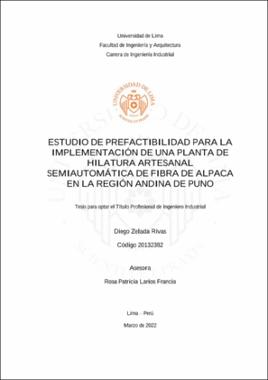Estudio de prefactibilidad para la implementación de una planta de hilatura artesanal semiautomática de fibra de alpaca en la región andina de Puno

Ver/
Tesis
(application/pdf: 2.016Mb)
(application/pdf: 2.016Mb)
Fecha
2022Autor(es)
Asesor(es)
Metadatos
Mostrar el registro completo del ítemResumen
La finalidad de este trabajo de investigación es determinar la factibilidad técnica, financiera, ambiental y social de la implementación de una planta de hilatura artesanal semiautomática de fibra de alpaca en la región andina de Puno a largo de 5 años. Los productos son el hilo artesanal de alpaca y baby alpaca de colores naturales vendido en ovillos de ½ Kg. El precio de cada ovillo de alpaca etiquetado será de S/ 80
por unidad y el de cada ovillo etiquetado de baby alpaca será de S/ 100 y se almacenarán en cajas de 12 unidades con un peso total de 6 Kg. Las proyecciones de la demanda de los hilos de alpaca consideran las repercusiones del COVID en las exportaciones y se evidencia que existe un mercado interno con una demanda para aprovechar, se estima que para el año 2022 habrá aproximadamente 221 802.63 Kg. De demanda interna aparente, lo que supera a la demanda de la empresa que es de 7 998.63 Kg., mostrando que existe un gran margen para crecer a nivel nacional, sin evaluar el internacional. La planta de producción estará en el departamento de Puno, distrito de Lampa y tendrá un tamaño promedio de 341 m2, dentro de esta el área de producción será aproximadamente de 94 m2. Se trabajará con hasta 3 turno de 8 horas por día durante 22 días al mes, se contará con un total de 23 trabajadores de los cuales 13 serán operarios y 1 será un operario especializado de medio tiempo en la clasificación de fibra. Con un cambio de moneda de 3.58 S/ /US$ se invertirá un total de S/ 561 112.05 para la realización del proyecto, de los cuales el 50% o S/ 261 852.29 será asumido por un préstamo de Agrobanco con una TEA de 5.00% en cuotas crecientes. Se observa que el factor tecnológico será un limitante en el proyecto, los resultados muestran que se tendrá un VAN Económico de 373 392.13 y un TIR financiero de 41.57%. mayor al COK de 11.04%. Con esta investigación se llega a determinar que el proyecto es viable y se satisface la hipótesis del trabajo. The purpose of this research work is to determine the technical, financial, environmental and social feasibility of the implementation of a semi-automatic artisanal spinning plant of alpaca fiber in the Andean region of Puno over 5 years. The products are handmade alpaca and baby alpaca yarn of natural colors sold in balls of ½ Kg. The price of each labeled ball of alpaca will be S / 80 per unit and that of
each labeled ball of baby alpaca will be S / 100 and they will be stored in boxes of 12 units with a total weight of 6 Kg. The projections of the demand for alpaca threads consider the repercussions of
COVID on exports and it is evidenced that there is a domestic market with a demand to take advantage of, it is estimated that by 2022 there will be approximately 221 802.63 Kg. Of apparent internal demand, which exceeds the demand which is 7 998.63 Kg., showing that there is a great margin to grow at the national level, without evaluating the international level. The production plant will be in the department of Puno, Lampa district and will have an average size of 341 m2, within this the production area will be approximately 94 m2. It will work with up to 3 8-hour shifts per day for 22 days a month, there will be a
total of 23 workers of which 13 will be operators and 1 will be a specialized part-time operator in fiber classification. With a currency exchange of S / / US $ 3.58, a total of S / 561 112.05 will be invested to carry out the project, of which 50% or S / 261 852.29 will be assumed by a loan from Agrobanco with an TEA of 5.00 % in increasing installments. It is observed that the technological factor will be a limitation in the project, the results show that there will be an Economic NPV of 373 392.13 and a financial IRR of
41.57%. greater than COK of 11.04%. With this research, it is determined that the project is viable and the hypothesis of the work is satisfied.
Cómo citar
Zelada Rivas, D. (2022) Estudio de prefactibilidad para la implementación de una planta de hilatura artesanal semiautomática de fibra de alpaca en la región andina de Puno [Tesis para optar el Título Profesional de Ingeniero Industrial, Universidad de Lima]. Repositorio institucional de la Universidad de Lima. https://hdl.handle.net/20.500.12724/15996Editor
Universidad de LimaColeccion(es)
- Tesis [1207]
El ítem tiene asociados los siguientes ficheros de licencia:

